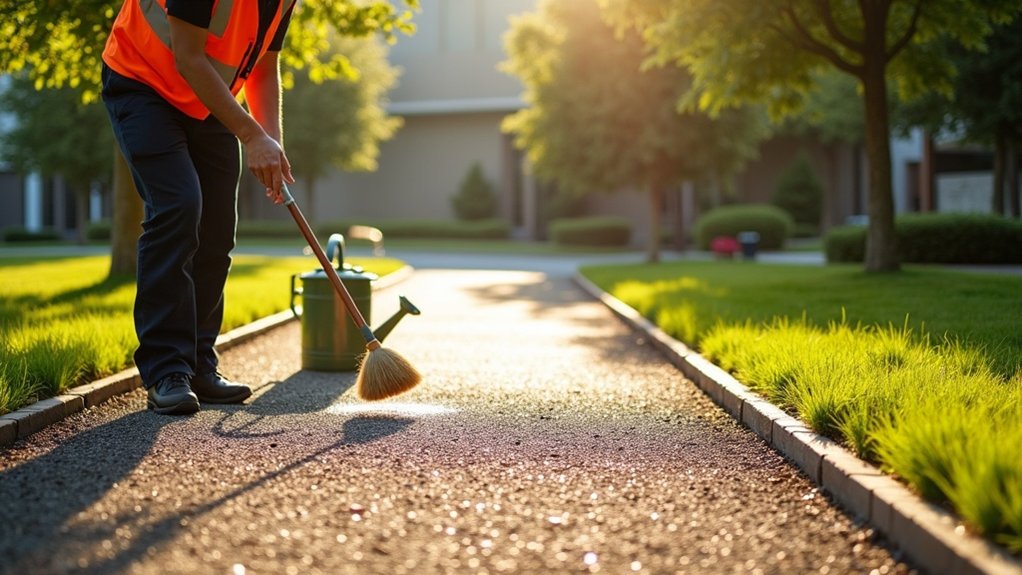Regular sweeping and hosing down resin-bound gravel keeps commercial spaces looking smart whilst preventing build-up of leaves and litter. A proper weed membrane beneath the surface, coupled with targeted herbicide treatments, stops unwanted growth. Watch for any cracks – sort these quickly with matching repair compounds to maintain safety and appearance. Tackle moss and algae straight away, particularly in shaded or damp areas, as these can be dangerous when wet. Good drainage is essential for British weather conditions. Whilst basic cleaning can be handled in-house, it’s worth getting professionals in yearly to ensure your surface meets commercial safety requirements and stays tip-top.
Key Takeaways
Regular upkeep of resin-bound gravel surfaces:
- Sweep the surface weekly with a stiff brush and wash with plain water – just as you’d clean your patio.
- Fit a quality weed membrane beneath during installation, and tackle any edge weeds with garden-safe herbicides to prevent spread.
- Check monthly for cracks, particularly after frosty weather. Sort small breaks quickly with matching resin repair kits from your supplier.
- Apply iron sulphate on mossy patches (common in shaded areas), and ensure water drains properly – standing puddles are your worst enemy.
- Book a professional maintenance firm yearly, much like servicing your boiler. They’ll deep clean and spot issues before they worsen, especially important for busy car parks and walkways.
Regular Cleaning and Debris Removal
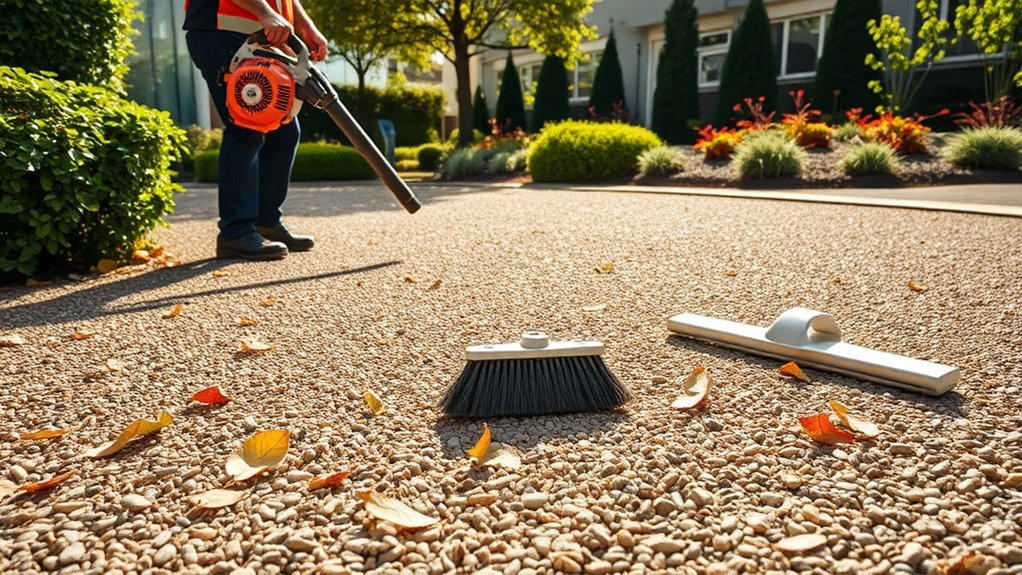
Regular cleaning keeps resin-bound gravel in top condition and prevents lasting damage. Remove leaves and other garden debris with a stiff-bristled broom, sweeping back and forth for best results. For everyday dirt, use your garden hose to wash down the surface – this helps maintain its appearance. Regular cleaning is necessary to maintain the surface quality of resin-bound gravel. Additionally, maintaining proper drainage is key to preventing moisture accumulation, which can lead to issues like moss and algae growth. Stubborn spots might need a pressure washer with a flat nozzle, but keep it 20cm away from the surface to avoid damage. Regular upkeep means you won’t need to resort to heavy-duty cleaning methods. Keep basic cleaning tools handy to deal with debris as it builds up.
Effective Weed and Vegetation Control
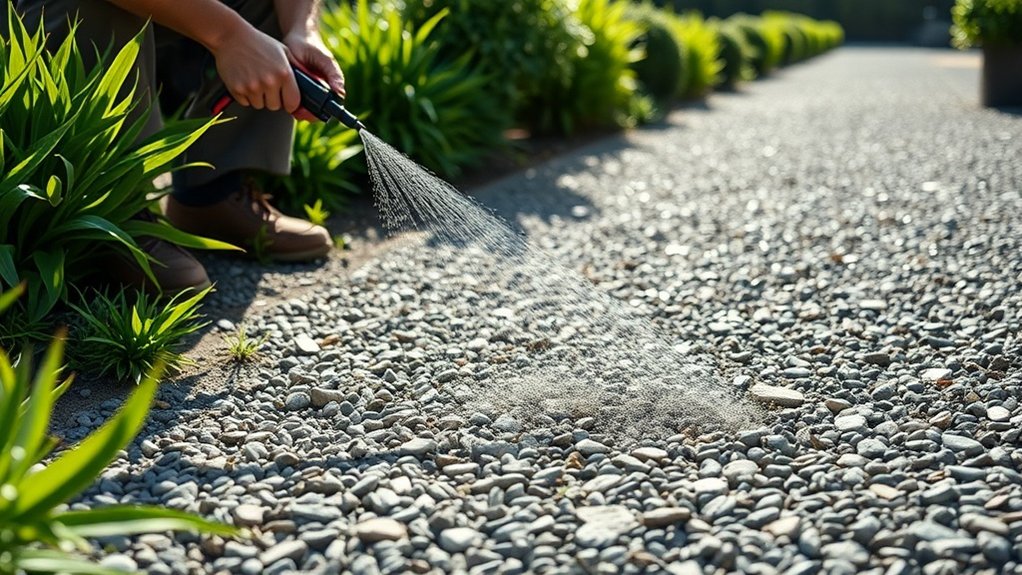
Effective weed control is crucial for maintaining your resin-bound gravel’s appearance and structural integrity. Installing a weed membrane during the initial laying process creates a vital barrier against underground growth. Properly installed resin driveways effectively prevent weed growth, which helps in keeping your surface looking pristine. Regular maintenance, including routine cleaning(routine cleaning), is essential for preventing moss and weed buildup. Check monthly for any cracks or damage, as these are prime spots for weeds to take hold. Apply a suitable herbicide around the edges once or twice per year, being careful not to oversaturate the resin surface. Keep borders tidy with regular trimming every two weeks to stop seeds from spreading onto your driveway or path.
| Control Method | Frequency | Notes |
|---|---|---|
| Weed Membrane Installation | Once (during install) | Blocks underground seeds |
| Herbicide Application | 1-2 times yearly | Use sparingly |
| Routine Inspections | Monthly | Check for cracks |
| Edge Maintenance | Bi-weekly | Clear vegetation |
Algae, Moss, and Slip Hazard Prevention
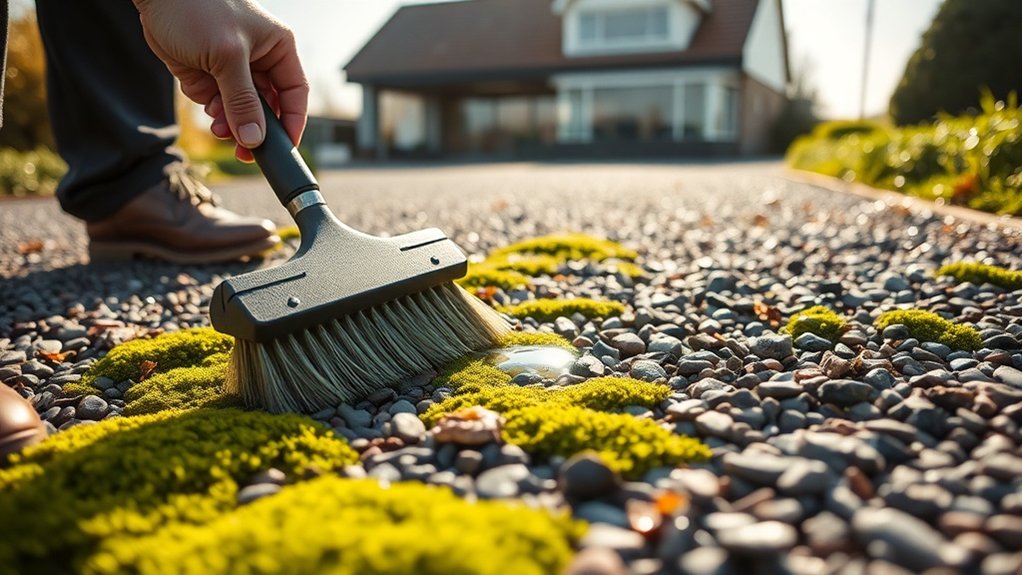
Controlling weeds is just one aspect of maintaining safe resin-bound gravel surfaces.
Tackling algae and moss is crucial, particularly for commercial properties where slip hazards pose real risks. In Britain’s damp climate, shaded areas are prime spots for moss growth, making proper drainage and ventilation essential. Regular cleaning and routine maintenance are key to preventing moss buildup and ensuring safety. Additionally, maintaining effective drainage is vital for preventing water pooling that can exacerbate moss growth in these areas.
A regular sweep and light wash will reduce the organic matter that encourages these growths. Start with a stiff-bristled brush for cleaning, followed by mild chemical treatments like sodium percarbonate.
Check your surface after rainfall and deal with any problem areas straight away. A yearly treatment with iron sulphate works well to prevent regrowth.
These simple maintenance steps will help keep your surface both safe and smart-looking throughout the year.
Surface Repair and Touch-Ups
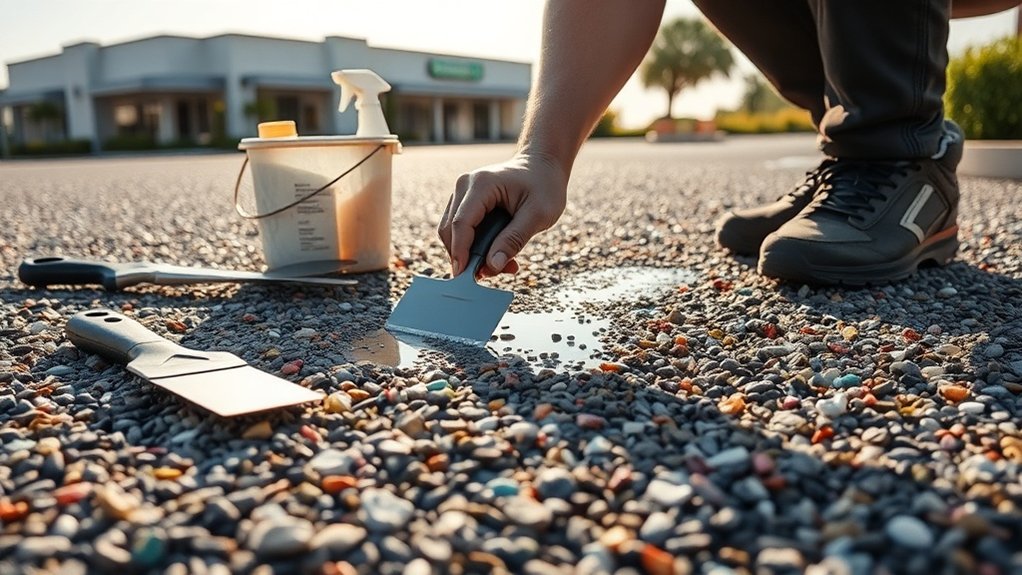
Keeping your resin-bound gravel in top shape is vital for looks and practical use. When cracks or chips appear, tackle them promptly using these repair steps:
- Open up any cracks with a chisel and clean thoroughly.
- Fill with suitable epoxy or polyurethane (choose one that works well in British weather).
- Blend the edges to match the surrounding surface.
- Let it dry for 1-2 days.
Before touching up, give the surface a good sweep or pressure wash, making sure it’s completely dry.
Add a UV-resistant sealant in thin coats – this works best for our UK climate. If you want to spruce up the whole surface, UV-stable clear coats work brilliantly.
Check your repairs regularly – spotting problems early means simpler fixes and keeps your gravel looking smart.
Most DIY shops stock these repair materials, but if you’re unsure, your local builder’s merchant can advise on the best products for your surface.
Drainage and Water Management
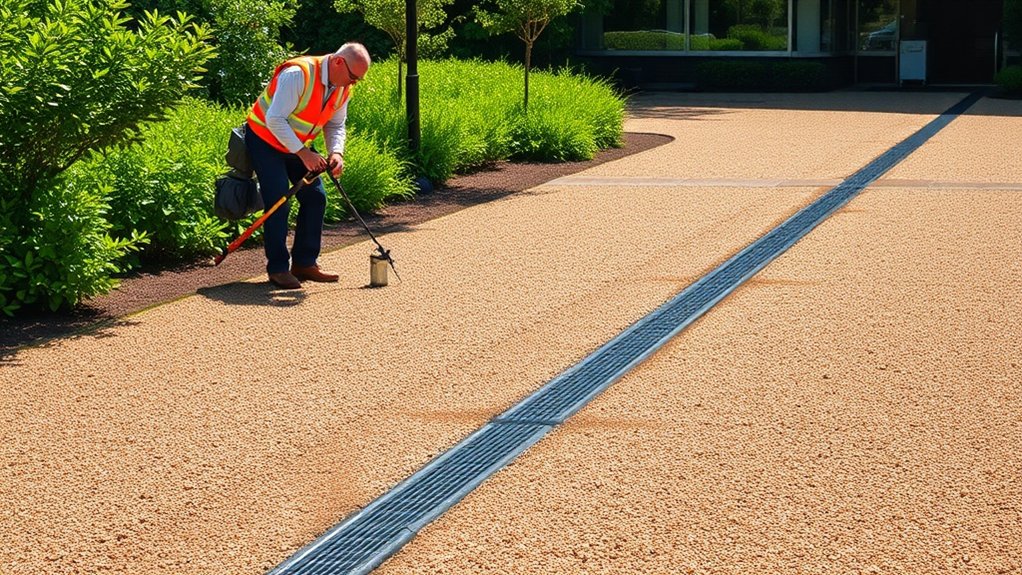
Proper drainage and water management are vital for maintaining resin-bound gravel surfaces across the UK. A well-installed permeable sub-base of crushed stone allows rainwater to drain naturally, preventing puddles and flooding.
Regular clearing of leaves and debris keeps the surface porous, whilst adding drainage channels or soakaways helps manage heavy British rainfall.
Keep an eye on your drainage system for blockages, particularly during autumn when fallen leaves are common. Avoid using non-porous sealants, as these stop water from draining properly – a particular issue given our wet climate.
Think of your resin-bound surface like a rain garden: it needs clear paths for water to escape.
Good drainage maintenance not only protects your surface but saves money on repairs. A properly managed system should last years, even with typical British weather.
Routine and Seasonal Inspections
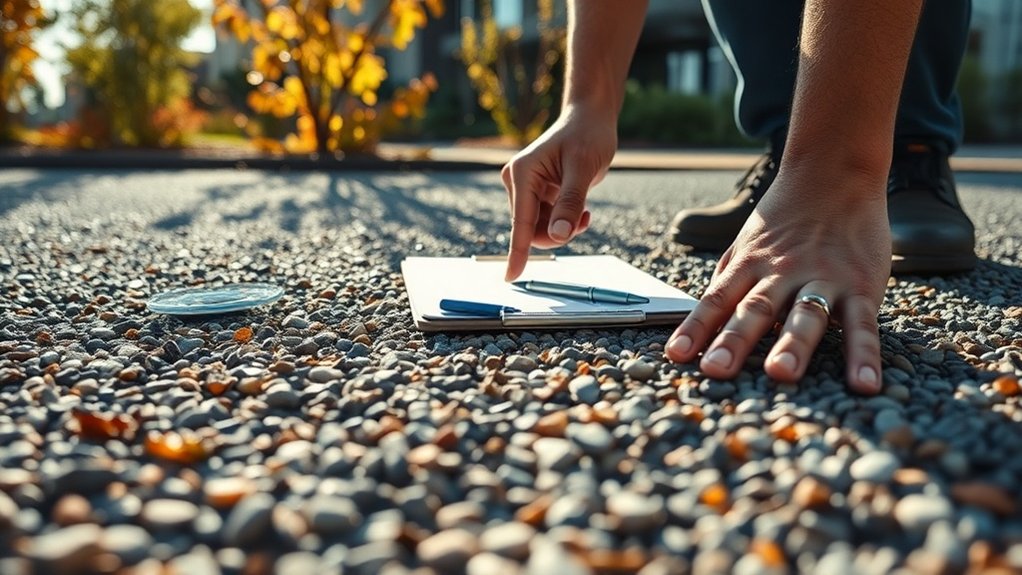
Regular inspections keep your resin-bound gravel in top condition and spot problems early.
Check your surface thoroughly each season, particularly after harsh weather. Look for cracks in autumn before frost sets in, clear fallen leaves to prevent staining, and examine for loose stones in spring after winter’s freeze-thaw cycles.
A simple walk-around every few months helps maintain your surface’s safety and appearance, saving you money on major repairs down the line.
Importance of Regular Inspections
Regular checks of your resin-bound gravel surface are vital, despite what you might think about its durability. These inspections offer clear benefits: they help spot early signs of damage like cracks and blocked drainage from built-up debris.
Proper monitoring ensures the surface meets UK installation standards and maintains its water-permeable qualities – particularly important given Britain’s wet weather.
Keep an eye on high-traffic areas, such as driveways and paths, where wear is most likely to occur. Sort out small problems before they become costly repairs.
Regular checks also confirm the surface remains safe and environmentally sound, staying slip-resistant even in wet conditions whilst maintaining its eco-friendly drainage properties.
A well-maintained resin-bound surface can last for many years, making these routine inspections a worthwhile investment for your property.
Seasonal Maintenance Checklist
Keeping Your Resin-Bound Gravel in Top Shape
Three essential seasonal maintenance tasks for your resin driveway:
1. Regular Cleaning
Clean the surface with a stiff brush or leaf blower.
For thorough cleaning, use a gentle pressure washer and mild soap – just like washing your car.
Skip any strong cleaning products as they’ll damage the surface.
2. Check Water Drainage
Look for blocked drainage channels, particularly after autumn leaf fall.
Ensure water flows freely to prevent puddles forming.
During winter, watch for ice damage, especially common in British weather.
3. Look for Damage
Check for cracks or worn patches, focusing on areas where cars turn or park.
Book a yearly professional check – much like an MOT for your driveway – to spot problems early.
Importance of Appropriate Cleaning Techniques
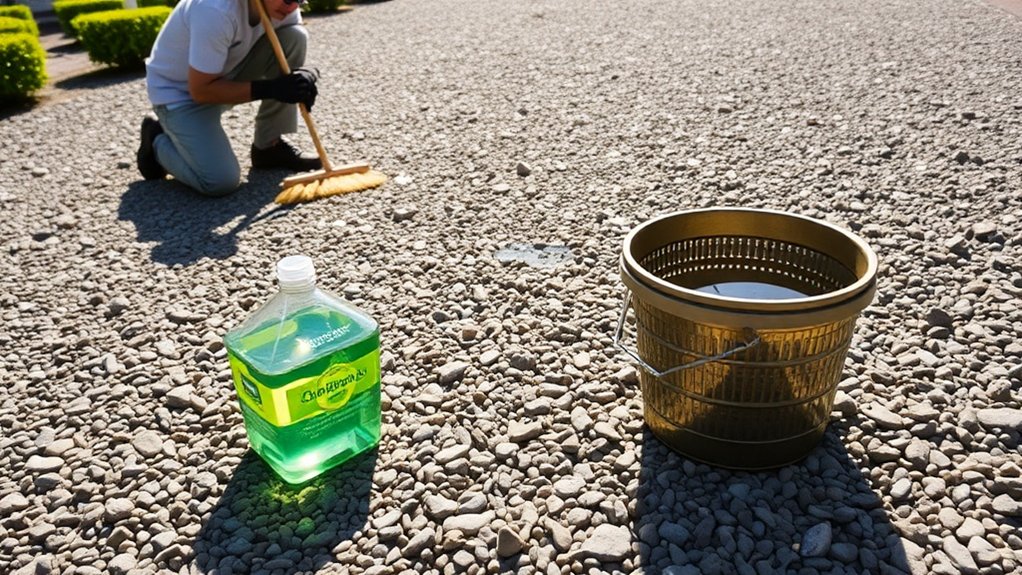
Proper cleaning methods are vital for resin-bound gravel surfaces to look good and work well.
Sweep regularly to stop leaves and dirt from building up, which can cause stains and make the surface slippery. A gentle hose-down helps keep the surface clean and bright.
If you’re using a pressure washer, keep it between 1200-1500 psi to avoid damaging the resin – much like washing your car, you don’t want to blast it too hard.
For tough marks, use mild cleaning products, rather than harsh chemicals that could harm the surface. Think of oil spills like red wine on a carpet – the quicker you tackle them with gentle soap and a brush, the better the outcome.
Following these simple steps will keep your resin-bound driveway or path looking smart whilst protecting your investment for years to come.
Managing High-Traffic Areas

Regular cleaning is vital in busy areas to stop dirt building up on resin surfaces. A thorough sweep and wash prevents both unsightly mess and dangerous slip risks, particularly during wet weather.
Simply staying on top of basic maintenance will keep your resin-bound gravel safe and looking smart for years to come. Common trouble spots include garden paths, driveways and shop entrances – these need extra attention, especially after autumn leaf fall or muddy conditions.
Increased Cleaning Frequency
Increased Cleaning Frequency
High-traffic areas need more frequent cleaning to keep resin-bound gravel looking smart and working properly. Match your cleaning routine to how busy different areas get – just like you’d clean your doormat more often than your spare room.
- Weekly or Fortnightly Cleaning: Heavy-use areas, such as shop entrances or car parks, need cleaning once or twice a week.
- Seasonal Changes: Step up cleaning in autumn when fallen leaves can stain the surface.
- Pressure Washing: Book a thorough pressure wash twice yearly to shift stubborn dirt and protect the resin.
These regular cleans will save you money in the long run by preventing damage and keeping your surface in top condition.
Slip Hazard Prevention
Preventing slips on high-traffic surfaces is vital for public safety and maintaining resin-bound gravel areas.
Use naturally rough aggregates to boost grip – think of the texture of coarse sandpaper – and avoid smooth finishes that become treacherous when wet. Mix resin and aggregate evenly to create a consistent, non-slip surface.
Good drainage is crucial. Keep the surface permeable, much like a sponge, so water doesn’t pool and create slick patches.
Check drains regularly and remove leaves, twigs and debris that block water flow. In busy areas like shop entrances or walkways, watch for worn patches that could become slippery and fix them straight away.
These practical steps will help keep your commercial space safe and slip-free throughout the year, particularly during Britain’s wet weather.
Professional Maintenance Services and Support
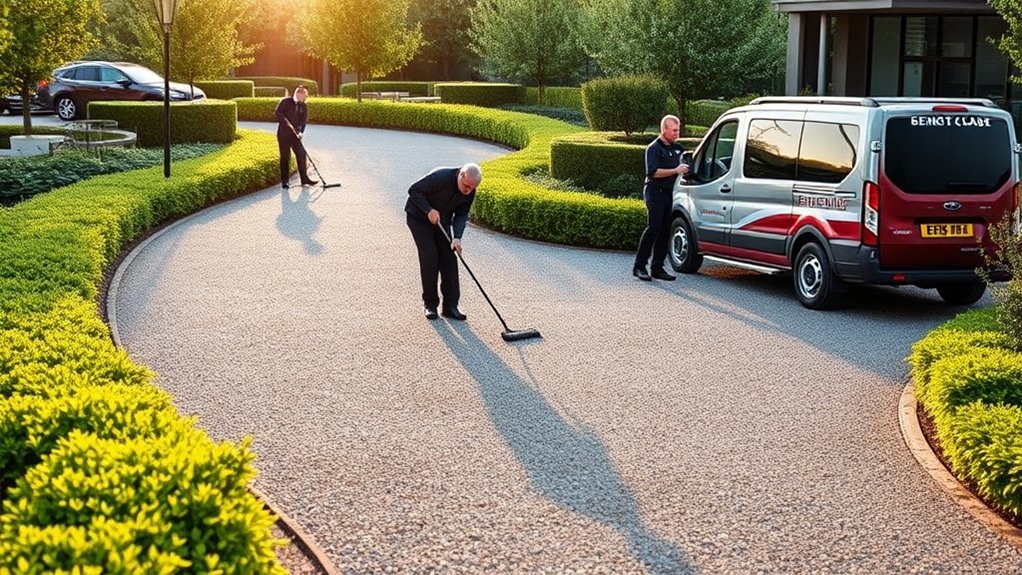
Professional Maintenance Services and Support
Proper maintenance from qualified specialists keeps resin-bound gravel surfaces looking great and lasting longer.
Professional care ensures safety compliance and helps protect your investment.
Three essential services to consider:
- Regular Cleaning: Skilled technicians use specialist brushes and controlled pressure washing to keep surfaces clean and structurally sound.
- Condition Assessment: Expert checks spot early wear and tear, allowing quick repairs to maintain grip and safety standards.
- Tailored Maintenance Plans: Customised care schedules focus on busy areas like entrances and walkways, particularly important for commercial properties.
Frequently Asked Questions
Can I Use a Vacuum to Clean Resin-Bound Gravel Surfaces?
Yes, vacuum cleaning works well on resin-bound gravel, particularly for leaves and loose debris. Use a vacuum with adjustable suction to avoid damaging the surface. For best results, tackle visible dirt first with a leaf blower or brush, then vacuum gently. Stubborn stains and ground-in dirt may need proper pressure washing or specialist cleaning instead.
What Types of Herbicides Are Safe for Resin-Bound Gravel?
Safe herbicides for resin-bound gravel should be carefully selected to avoid damaging or staining the surface. Water-based weedkillers containing glyphosate work effectively whilst being gentle on the resin. Look for products specifically labelled as safe for use on decorative surfaces and driveways. Local garden centres often stock suitable options, such as Roundup Path or Pathclear, which are particularly popular amongst UK homeowners.
How Does Resin-Bound Gravel Compare to Other Paving Materials?
Resin-bound gravel stands out amongst traditional paving options, offering notable benefits over concrete and tarmac. It’s particularly hard-wearing and keeps its appearance far longer than conventional surfaces, with strong resistance to both cracking and sun damage. For British driveways and gardens, where weather can be particularly harsh, this durability proves especially valuable.
Is It Possible to Install Resin-Bound Gravel Over Existing Surfaces?
Resin-bound gravel works brilliantly over existing surfaces, provided they’re stable and properly prepped. For best results, the base surface (whether concrete or tarmac) must be crack-free and sound. A quick power wash and primer will ensure proper bonding, whilst correct resin application techniques prevent future problems like surface cracking. Think of it like painting a wall – the prep work makes all the difference to the final result.
What Are the Costs Associated With Maintaining Resin-Bound Gravel?
Regular upkeep of resin-bound gravel needn’t break the bank. A simple jet wash twice yearly (around £50-£100 per clean) and occasional resealing every 4-5 years (roughly £15-£20 per square metre) keeps the surface in top form. Sorting small cracks early costs about £100-£200, far less than major repairs down the line. Think of it like maintaining a car – regular servicing saves money in the long run.
Conclusion
Regular maintenance of resin-bound gravel is essential for commercial properties. Much like servicing a vehicle, routine upkeep ensures the surface remains presentable and functional. Focus on three key areas: thorough cleaning, managing weeds, and addressing surface damage promptly. Whilst many tasks can be handled in-house, certain repairs may require professional intervention. Well-maintained resin-bound gravel not only preserves your property’s aesthetics but also extends its service life.
